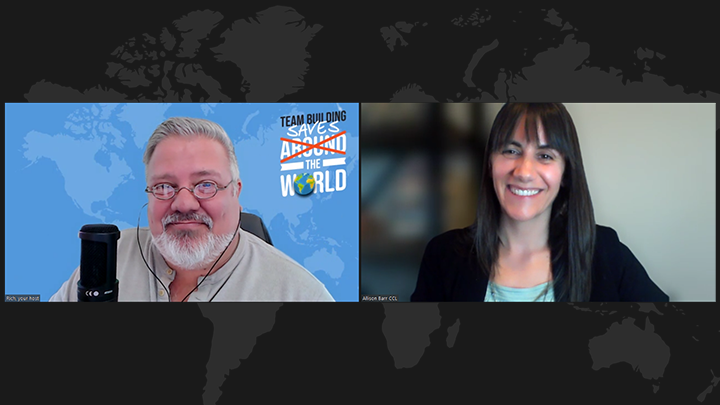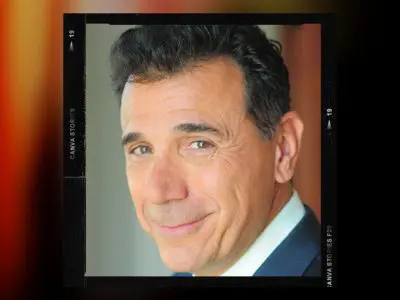Rage Quitting
with Allison Barr
Use the buttons above to listen now.
Transcript - Rage Quitting
Rich: On this episode of Team Building Saves the World.
Allison: I think people are tired of being treated as if they are just a means to make money. That becomes hard. Right? You might have somebody who
is just having a bad couple of weeks.
Rich: That doesn’t mean you quit, but we’re looking for patterns
are we seeing a change in rage quitting as, from this perspective from the
Allison: new world order?
Do you know? What’s interesting is that I found those answers to.
Rich: So, this is not an easy fix that we’re talking about.
Allison: It’s not and it is.
Rich: Hello team. It’s me, your old friend, Richard Rininsland host of team building saves the world, the show where I speak to the leaders and innovators and employee wellness and the corporate culture and how it reflects in the world of today. And today, I don’t want you to get mad, but we’re talking about rage quitting with the leadership solutions.
At the center for creative leadership, Allison Barr but first I need to share some love with my support as a team bonding. If your team is ready to experience teamwork through the power of play and visit team bonding.com to learn more now team join me in welcoming the leadership solutions partner at the center for creative leadership and the co-host of Lead with that podcast.
Alison Barr
oh, right. Awesome. Thank you so much for coming on board with us. It’s great to have you here. Why don’t we start off as we usually do, just tell my team out there a little bit about yourself and how you got involved in this part of the industry.
Allison: Sure and thank you for the warm welcome. And the applause that I know is very real.
Rich: Oh yes. It’s a thousand people. I keep trapped under my desk.
Allison: I don’t know if that’s something you want to be telling people, but I’ll take it. So thanks for having me. Yeah. I, gosh, how did I get involved in this field? To be honest, I always knew I wanted to learn about psychology. I always knew that, and I waited about six or seven years after my undergrad to get my master’s degree in psychology.
And by that time I had already been a manager with no training and, and I mean, zero zero training. I manage approximately 30 people or so I really enjoyed it. Had a great time. I learned a lot about business during that time, I learned a lot about management and decided that I wanted to really apply that understanding of people to the business setting.
And so, um, you know, just something that I always thought of was if someone wants to have a successful business, it seems, it seems natural and important to have an understanding of people. Regardless of what level you are in the organization. It seems like it would be important to do that. So went to grad school.
When I was in graduate school, I worked for a retail organization that prioritize, um, leadership development. And I’ll be honest with you. I didn’t even know that that was a thing at the time. And so, because I was a manager at that time as well, I was really able to apply what I was learning in my graduate program to the business, as well as the leadership and development side. So fast forward a whole bunch of years, I graduated. I took a job with that same retailer in London. So I lived over in London for a bit focused. It, my job really was to focus on new store openings, entering new markets in Europe, in the middle east.
And because again, same retailer had such a heavy focus on leadership and development. I realized you can have a really great business strategy. And that’s very important. You don’t have a great leadership. It’s going to be pretty difficult to achieve that strategy. You can let it might come with a cost.
So now I’m back in Colorado, as you said, working for the center for creative leadership. And here we are
Rich: rage quitting. Now, back in the seventies, you know, being someone who was alive during that time, period, I certainly remember that famous old song. Take this job and shove it. Yeah. But rage. The rage quitting that I know is as a video game player in the eighties, just getting upset at your console and throwing it down and tearing the disc out of the, out of the play.
What does it mean now? What are we looking at?
Allison: Well, I think we’re looking at exhaustion. I think we’re looking at and evaluate or re-evaluation rather of what work means to people and the pandemic certainly highlighted for a lot of people in the United States, at least. How much time they are spending at work and when they’re not working, they’re commuting to work or when they’re not commuting to work there, they’re mentally preparing for work.
And so I think a lot of people realize, you know, my life is my work right now, and I don’t want that. And I’m exhausted and I’m tired of being a cog in the wheel, so to speak, you know, not every industry has problematic behaviors at the workplace, but a lot do. And I think people are tired of being treated as if they are just a means to make money.
Rich: Okay. Yeah. So we’re talking about people who are just getting to that point where they are so fed up, that they they’re literally just walking out.
Allison: Yeah, that is what we’re seeing. And of course, that’s, that’s a, that’s a very high privilege to be able to do that a lot of people keep their jobs, but that’s what we’re hearing too, right. Is, you know, people are trying so hard to make it work. And on the flip side, you’re battling a pandemic that nobody had a plan for. Right. And so when you sit on a board or you’re in the C suite, you’re, you’re also racking your brain.
We did not have a plan for this. How could we, and so there’s a lot of reactive behaviors going on, right?
Rich: Yeah. So we had, because last season in the podcast, we had talked about the great resignation and how the pandemic just seemed to take this thing that was slowly building and just set it ablaze. I mean, I’m looking at statistics from last year.
Statista actually wrote 4.4 million Americans left their jobs in September. of 2021. And we’re still talking about companies that can’t get, you know, the, the skilled people to come in to fill those positions. Um, how most of the millennials are now the major portion of the workforce, but they’re the ones who are looking for more out of their careers than just the paycheck.
So as is rage quitting, just another part of this great resignation, or is this something else?
Allison: I think it is. And I think underneath it all, it’s I think we will come out on the bright side. I think it’s highlighting some things at the workplace that can be shifted and changed and, you know, to tag onto what you said, some people do want their job to just be a paycheck.
Some people are tired of the culture of work is life, and you need to come to all of these, you know, happy hours and they don’t want to do that. Right. And then there’s this whole push. I don’t know if you’ve been following this. There’s another push towards, uh, pay equality and pay transparency. It’s it used to no longer be acceptable to quit a job after one or two years.
And now the mill, I believe the millennial group is shifting that, you know, they have the biggest share in the market right now and they want more money. They want pay equality. And so job jumping I’m air quoting here, but job jumping is also becoming a thing. And so employers are also battling with that
Rich: So speaking of the employers, is we have talked about a few times in the podcast now about.
The finances of when somebody quits is, is remarkably expensive for any organization. How do we see this coming? Is it, is it, is rage quitting a surprise? Or is this something that we can actually keep an eye out for
Allison: I think its both. I do think again, the pandemic has caused, um, a CR quite a kerfuffle and in every system, in any organization, Regardless of the organization.
And so I don’t know that we could have planned for that. I don’t know that anyone could have had a blueprint for that. And I do think this trend will continue. I do think it will. I mean, last year, I think you mentioned the statistic was 6.7 million in September alone right now. That’s I think it’s double now into 2022, the amount of people quitting.
And so I think it’s important now to start to focus on. What managers and leaders can do there. Of course, you know, ways to identify pre quitting behaviors, which can be important, but it’s probably a good idea to focus on retention rather than giving yourself the anxiety of searching for pre quitting behaviors.
Rich: So if I’m that manager, what am I watching for?
Allison: So if you’re a manager, some of the behaviors, and I will say that Harvard business review has a great article on this, too. If anyone wants to give that a Google, you can, you can look at our, um, you know, maybe they’ve shown less interest in, in engaging in general. Um, their productivity is decreased or communication styles decreased.
They might have a shift in attitude and of course all of these things can be subjective. And that, that becomes hard. Right? Know, I have somebody
Rich: who is just having a bad couple of weeks. Yeah.
Allison: It doesn’t mean you quit, but we’re looking for patterns, right. And severe changes. Like maybe they’re calling, calling off regularly, um, and not responding like they used to and showing less interest in work.
If somebody has a, you know, leads a team with customers. Where there’s a client facing team. If they’re interacting with customers and clients and maybe a negative way where they haven’t before, that would be a sign as well, leaving early and more frequently, shutting down more frequently early that’s those are all signs.
Rich: Okay. What are some of the causes though that we’re seeing of it? I mean, we know that we have a lot of different indicators with the pandemic but to actually get to the point where you’re just ready to get up and walk out. That seems to, it seems an extreme reaction at first. Is it an extreme area?
Allison: It is, it is an extreme reaction. And again, like, you know, we need money to survive, right? Like we can just be honest about that. So to be pushed to that, to that type of level, I think is extreme. And so I think one thing that’s interesting to mention is that workplace retaliation cases and discrimination have increased dramatically over the past two years.
So that’s something to keep an eye on. And one thing I want to underline there is. You know, there are other means to report those types of things that you and I will never see because a lot of times those types of cases are handled very privately. So if you can only tell us so much, right. And I think it is over, I think it’s work being asked to work one or two roles.
That’s very common for employers right now to say something like, you know, rich, we need you to take on some of Susan’s work because Susan quit. Right. So it’s like the taking on additional work . Um, a lot of people are saying when my manager doesn’t trust me, it creates a whole host of problems for me, and I feel micromanaged and that’s enough for me to rage quit.
I don’t want to be micromanaged. I don’t want to feel like I’m being babysat. That’s enough for me to rage quit. Um, so it’s a lack of trust and micromanagement and unfortunately, a lot of that. Discriminatory and retaliatory behaviors in the workplace are causing,
Rich: is there something other than management that’s actually, because what I’m hearing is this is a lot of management versus employee.
Allison: It can be, you know, sometimes if we’re talking about those retaliation and discrimination cases that can happen at any level, I think. Even your frontline managers or your middle managers, you know, they sit in the organization, they’ve got a tough role because they’re fielding information from all sides of the coin.
Sometimes there’s only so much they can share. And so I think, is it just a management problem? Not necessarily. I think it can be a structural problem just in general. Right? Like, you know, upper management needs to look at how they are communicating information and how they’re handling requests from employees.
That sounds something like, you know, Hey, rich, I needed to confide in you and I’m feel like I’m being micromanaged. Can you help me? They need to take those things seriously. And I think oftentimes we don’t.
Rich: All right. Well, if you don’t mind, I know being an old hat of this, you, you know, what a live read is.
So let me step away just for a quick second here, because I do as always need to tell my team out there about a company I’m so proud to be a part of team bonding. Team bonding was founded over 20 years ago with one simple question. How can employees have a great time while fostering strong, authentic bonds between people who work together?
They’ve created a catalog of innovative events using the power of play as a learning tool and tapping into the correlation of work and play from scavenger hunts to jeopardy and so much more the team bonding of activities, whether live virtual or hybrid maximizes the impact of team building with an accent on.
So visit team bonding.com to schedule your event. Now, team bonding, when you want seriously fun results. And we are back with Alison Barr Alison we’re talking about rage quitting. How do we solve it? What’s the solution. I mean, how can we keep these employees in the seats? What are they looking for? And what is management willing to give them now?
Allison: So I think it’s a matter of understanding the balance of people in process, right? You have human beings who run an organization, and then you have your processes and your structures within the organization. What is very common for leadership at any level is to over-focus on the process because if I’m a leader, I want to make sure that I know, and I understand the processes and those are within my control, right?
They’re delegated to me. They’re most of the time on paper, they’re a bit easier to structure and people side becomes a little bit more complicated because people are complex. And so for most organizations, for most leaders, there needs to be a shift or a balance to balancing out those people on process sides.
And I can suggest that one tool that I frequently use is research by a gentleman named Dr. Fred Morgansen he’s out of Michigan. And, um, he has a lot of really interesting information on the people side that the researcher states is that there are three pillars that you need to focus on in order for your teams to be performing at the workplace.
And it’s really quite simple. A lot of managers, again, regardless of leader level can use it as a diagnostic tool. Things seem to be going south. I didn’t even notice that some of your employees are, um, you know, showing you some of those pre quitting behaviors. You can have a look at these three pillars.
So they include planning, which is planning, right? The understanding of our goals. What are we trying to achieve together? What are our objectives? Who’s responsible for what, between the three of us on this call right now, who’s doing what and being very clear about that, right? The second pillar. Is execution.
So communicating that plan and communicating it very clearly. Oftentimes, this means over communicating. This is where collaboration happens and this is where a leader or a manager needs to monitor the progress and make sure that we’re on track. Right? Okay. The last one is interpersonal and this includes trust psychological safety, motivation, conflict resolution.
So planning, execution, interpersonal. And do you want to guess which one of those is most often neglected? If you had to guess, oh,
Rich: I’m going to take a shot at number three.
Allison: Yes, it gets. Um, so yeah, there’s, the interpersonal is often neglected because it’s not as straightforward. Right. And there is an assumption and okay.
Assumption that employees will show up to work and put interpersonal needs, you know, aside because. We’re human. We should know how to do that. Right. We should be able to come to work and we should know how to do that. And we’re humans, right? Conflicts, inevitable. It’s going to happen anytime of more than one person you might disagree.
And that’s very normal. So it’s very, very important to focus on that last one.
Rich: Okay. And how do we do so, I mean, what, what are some things we can. Yeah,
Allison: I knew you’re going to ask that really in any working relationship, regardless again, of the leader level, regardless of the people you have to have. And you have to have a manager who listens and I mean, actively listens.
So rather than listening from a place of me wanting to tell you what I think about what you just said, it is really listening from a place of understanding and creating a culture where feedback. Is normalized. And so a lot of that’s around communication. And again, what can become tricky about that is that trust is, you know, a non-measurable trust is built in broken behaviorally.
And so something that is my trust might not break yours. So it’s tricky. Um, so developing that culture of feedback is absolutely crucial in that active listening piece.
Rich: Plus, you’re talking about in a, in any given marketplace, While we say that, of course the millennials are the ones who are pushing it most now you still have up to five generations working under one roof. So, and even within those generations, you’re going to have people whose needs are varied. Absolutely. So this is not an easy fix that we’re talking about.
Allison: It’s not and is it’s not and is I know that’s a very consultant answer to give you it’s a change in behavior and change our behaviors can be hard.
However, if you start to become really keened into it. And I would say for two weeks, like if you’re listening, give yourself two weeks and maybe just focus on that active listening piece and see what shifts for you. These are things that will develop over time. It’s not going to happen overnight. We’re not just to hold the Great Resignation overnight.
We’re not going to solve rage quitting either. However, if, if you have one-on-ones with your team, again, regardless, you could be a CEO or a frontline leader anywhere in between. People want to be heard and people wants to be taken seriously. That that stuff does not go out the window just because we’re at the workplace.
So that’d be my, my offering, right. It takes two weeks to solidify a new behavior. So for two weeks, just try that active listening piece. See what happens, try asking for feedback, see what happens.
Rich: Okay. And so are you talking about that from the employee side or from the management side? Okay. What about the employee themselves?
Let us say that I’m an employee. Who is every day when I’m coming to work, I’m getting that, you know, w w that last bit of straw on the camel’s back, I’m closer and closer and closer. What can I look out for, for myself to help mitigate my own circumstances?
Allison: Yeah, that’s a great question. And this, this really depends on circumstance, and I want, I really want to highlight that because there are some workplaces.
Very much do not allow for open conversations. And that is a cultural thing. May not be fixed right. Culture can be difficult to fix. It has to start from the top. And so for some people, it, it might be a big threat to their livelihood to speak up about their experience. However, if you’re an employee and you’re, you’re close to your wit’s end, right?
And you work, some people really like their work. They don’t want to quit. And you like your work, learn how to speak objectively and learn how to speak from I. So it’s very different for me to say to you rich, if you’re my boss for me to say, like, I am so unhappy in my job and the way that you are micromanaging me is driving me crazy.
Versus, Hey, I really liked my work here, rich. And I’m wondering if we could get to a point where you trust me a little bit more and you’re not checking in with me every day, right? Like what would that look like? And what do you need me to do differently in order to, for that to happen? That’s very different than saying your style of leadership is not working for me rich, and I’m not happy.
Response is gonna be very different as my boss.
Rich: Well that’s going to help with that psychological stability? Do you think the, the feeling that they can actually openly communicate.
Allison: Absolutely. And, you know, I don’t want to guarantee it because it depends on the recipient, but a lot of times people get put on the defense when they feel as if they’re being blamed.
And sometimes there is blame to be had, but you need to find a way to solve for that in a collaborative manner. And that means stating things in an objective and factual way yesterday, when you stood behind me and looked over my shoulder and corrected five of my mistakes really uncomfortable, what, what would it look like for you to trust me to do this on my own that’s solution oriented.
Rich: Okay. Let’s stay on the side of the employee now for a second. If you don’t mind, I I’ve gotten to the point where nothing is going to fix it. Nothing is going to repair my feeling. About the work that I’m doing for this company, what is honestly the best way to make sure I get out with dignity, but also with my career not being forever marred.
Allison: Yeah. So a lot of organizations will do exit interviews, not all of them, surprisingly a lot will. And so I think it’s important to note that. Employers use those exit interviews to look at themes, right. To look at red flags, to look at turnover, costs, that kind of thing. Right. And so it really depends on your reasoning for leaving.
If your reason for leaving is for example, I am micromanaged every minute of my day, because that does constant work, but by the way, it might, you might say something in a diplomatic way such as you know, I would love to have had more autonomy in my. I would have loved to have more trust and independence to, um, contribute to the organization with my skills and talents.
That way people can read between the lines, right? You want your message to be heard and received. And the moment we say something like Johnny was a horrible micromanager. People will be put on the defense period, no matter who it is, people will be put on the defense because they still work at that organization.
So you state things in a way that are diplomatic, that people will feel comfortable to reach out to you and recommend you. And in a way that your message is still heard, but it’s not full of blame. Here’s what I would have liked. I would have liked to feel, you know, I would have liked to have more autonomy in my job, for example.
Okay.
Rich: All right. Now, when we had first started talking about. Before we came onto the podcast itself. You had mentioned about control w how much of this is honestly, within an employer’s control and how much of it isn’t
Allison: a lot of it is. So for some people, you know, if you’re looking at finances and pay, that gets tricky, you have to understand an organization from the big picture, right?
Organizations do their budgeting a year and it’s sometimes a year in advance. So sometimes the pay itself can become tricky if that’s your reason for leaving. Right. But all the other things generally are around interpersonal behaviors. People underestimate the power of the soft skills, which I don’t love that term.
Um, but I do think a lot of it comes down to looking at myself as a manager or a leader. And what am I bringing to my team and being very honest about it. I do think it’s within the controls. You can start to ask your teams for feedback. What do we need more of? What do we need less of? Um, what can I start, stop and continue.
And you might have to say no to some of those things. However, you’re opening the door to your teams to have a voice. And a lot of people need that.
Rich: What about on a more let’s look at those businesses. Turnover is a part of the job. I mean, we, we were all kids at one to age and we, you know, one time in our lives, we’ve all had the, you know, gas, pumper job, the, you know, the, the, the fry Slinger job, it seems to be built in, especially when you’re working with a younger.
What can they do? Cause that, cause as we’re understanding what a great resignation, those jobs are not being filled by anyone. So is there anything that they can do or that they’re starting to do?
Allison: We’ll speak to a local company here that we’ve been working. That is a chain of restaurants. And of course, restaurant the restaurant industry’s been hit very, very hard and they have high turnover in anyhow so they’ve been hit very hard. Some of those roles are not being filled. And so what those types of organizations can look at are hours. You know, like what kind of hours am I giving my people? My expecting people to work 12 hour shifts. Am I paying overtime? Um, am I giving people. The time off that they need, right?
So the restaurant industry, and even like the gas industry, um, convenience shops, those types of things. When you have a part-time employees that are not salaried, sometimes filling shifts can become very difficult. You might ask for time off, and I can say, I can give you Monday, Tuesday, but not Wednesday off. Right? Because we don’t have anyone to fill that shift. It is ensuring that your processes and your policies are in. For people to call in sick people to have vacation time, time off as they deserve. Right. I think a lot of those types of industries need to get, have a hard look at their policies and procedures to ensure that people can have a healthy, healthy lives.
Rich: And of course that builds over and all the industries should honestly be looking at life from that perspective.
Allison: Absolutely. But as you may or may not know, you know, some of those smaller like retail restaurant, convenience store, those types of industries, it’s not uncommon for employers to say, I need you to work a double shift, right?
I need you. I’ll give you 30 minutes off in the middle. There’s gotta be a way that we can hire enough people to have all your bases covered. Right? It might look like having an on-call policy, but making sure that your ducks are in a row to get ahead of those hiccups, that inevitably are going to happen.
Rich: Is there a counter side of that coin though? Are we worried that if we have too many people that now you’re starting to lose people through the gaps?
Allison: Could it be right? Yeah. It is about that balance and depends on the organization’s needs or the business’s needs. But I think having on-call having an on-call option for people can be, can be really helpful to ensure that you’re not spending too much on your employee.
Right? Like you’re not over spending budget on hiring people at an on-call or an. Adjunct policy where it is like rich, I’ll call you by noon on Tuesday or 11:00 AM. If I need you to come in at 4:00 PM for the closing shifts that way again, like, you know, you’re very clear on what’s going to happen. If you don’t hear from me by 11, then you are fine.
Right. But those industries, people are feeling overworked dramatically and underpaid dramatically. And unfortunately in those industries, there’s not, there’s, there’s not a lot we can do right in this moment in terms of
Rich: right. Let’s look now because the world has moved largely virtual or some hybrid thereof. Are we seeing, are we seeing a change in rage quitting as, from this perspective, from the new world?
Allison: Do you know, what’s interesting is that I found both answers to this. I found both answers. So for some that hybrid or the at-home workplace is, is a wonderful solution. It’s allowing for people to save two hours of commuting or, um, you know, Ensure that they can feed their dog at their lunch break or whatever it might be.
Right. It can lessen stress for a lot of people. On the flip side, I was listening to a podcast, uh, the wall street journal podcast, and they were interviewing a handful of management consultants. That’s a specific industry. However, these management consultants were saying. I have no idea how much time I was actually working.
I had no idea that I was working from 5:00 AM until sometimes 11:00 PM. I just didn’t occur to me. And so I think it’s doing a little bit of both. It depends. I think a lot of people are very grateful to have hybrid or virtual.
Rich: We also know nowadays we were hearing a lot about the millennial generation.
They don’t just care about their personal job. They care about the company that they’re coming into. They have the full, the full culture, knowing that a lot of these things cost money as the higher management who are just hearing about people quitting, left. Right. What kind of things, can we start instituting that might keep those people who haven’t left yet.
Allison: So did you say as the hiring manager, did I hear you right?
Rich: Well, the higher ups, the, the higher up maps.
Allison: Gosh, there’s a lot. So I would say one of the first things that they can do and should do. As how, what I, what I will refer to as a listening session. And I’ve already mentioned on this app, this notion of active listening, I can not, I can not underline it enough.
People want to be heard. And so a listening session could sound. Over the course of the next three months, our CEO is going to do a one hour listening session. You can sign up for one, right here are your options. And you give her a variety of options because people are in different time zones and different varying responsibilities.
And so during that time, you know, the CEO or somebody in senior leadership can say, You know, we’re hearing some concerns or we’re noticing the great resignation. What, what do you want more of? Like, let’s have a conversation about it. You will need to have somebody to facilitate, right? You will need to have a powerful for facilitators to be able to set up at the very beginning.
You need to set up rules and norms of engagement. It could be a free-for-all, but I would absolutely recommend doing that. And your facilitator would then take notes of themes. People want to be heard. And then after those listening sessions you would follow up with, here are the themes that we heard and here’s some of our thoughts for next steps for the employer.
You’re not going to solve everything has to be impossible. Right? You need to start with what people want. And for the most part, people aren’t asking for. For much, right? Like you might hear. I would like to be able to take time off in the middle of the day. And I’ll work till 8:00 PM instead, but I would like to have two hours in the middle of the day for XYZ and a lot of organizations, not all of them, but that’s doable.
Right. So I think you’d be surprised to hear what people want. And then, you know, when you go to recruit new people, then you’ll be able to touch on those things because you know, some of, some of your millennials and gen Z and gen X even are going to ask those questions, right. What are you doing for work-life balance?
Like what’s the culture of your company? Like, can you give me an example and providing those examples out of connection in senior leadership and the rest of the organization will be important.
Rich: Alison, thank you again for sharing your expertise with us. It’s a fantastic subject I have from my very earliest memories, had it beaten into me by my none, not physically, but mentally beaten into me by my parents as I was coming up and starting to get work.
You never just quit no matter how bad it is, you don’t just walk away. You give your two weeks so on, so forth. So it’s fascinating to me to hear that this is becoming more and more. Um, not so much a trend, but, but an occurrence.
Allison: Yeah. And then hopefully we’ll normalize here soon. Right? I do think we’re at, we’re at the starting to get to the peak of it.
So hopefully we’ll normally scarcity.
Rich: That’s what they’ve been saying about a lot of things last couple of years. Let’s hope. All right. Once again, my team, please give a big round of applause for Alison
You were fantastic. Alison. Thank you. And. I hope you’re ready now because yep. You know what it is, it’s time for my speed round.
all right, Alison, this is very simple. All it’s going to be for the next 60 seconds. You’re going to be hearing some music. It’s going to be playing. That’s how I keep track of the time. In that time, I am going to be actually going through a series of innocuous. Your objective is try to answer them as quickly as you can stream of consciousness.
First thing off the top of your head as you are the first guest of season three, you have some luck because you’re setting the bar for everyone else. We’re going to call it the Alison bar. Oh boy. Or the Alison bar bar. Whichever way we want to go with it. It could be fun. All right. So if you’re ready.
Let’s listen for the music and the questions will begin. What’s your name? Alison. How many kids do you have? You’re out. Tell me something you remember from kindergarten.
Allison: Oh, I brought my stuffed animals sleeping.
Rich: How would you describe this podcast to your friends? This is. Nice. What was your favorite toy growing up?
Allison: I stuffed animal Harold’s.
Rich: Okay. Who would you call the world’s greatest musician.
Allison: Anyone in Led Zeplan awesome.
Rich: Would you rather live for a week in the past or the future?
If you could be any cartoon character for a day, who would you be? Wonder woman. Eyes. Okay. Tell me one choice in your life you regret
and your favorite holiday is, and there we go. Alison 10 air respectable. Indeed. That’s a good way to start. All right, Alison, once again, thank you again so much for coming on board. We hope to hear from you again soon. Maybe if this thing starts to level off, we’ll actually come back and we can explain why.
Allison: I would love that. Yes. Thank you again.
Rich: And thank you everyone out there. That’s it. My team, we have put to bed the first episode of season three of team building saves the world. If you’ve enjoyed this episode, whether you’re new to the podcast or an old fan of the show, please be sure to share this podcast with everyone.
Whether they’re your coworker, friend or family, it’ll help us to share all of this vital information. You can find out all about us, including all past episodes of the podcast@teambonding.com slash podcast. You can also find us wherever you find your favorite podcasts, Google podcasts, apple podcast, Spotify, wherever you go to listen, we will be there.
Don’t forget to look for us and all the social media. The team bond podcast and leave us a message telling me whether you like the show, or if you have an idea for a future topic on the podcast, we want to hear from you. And if I like your comment, I may even mention it on a future episode, but where we see our final farewells for this, the first episode of season three of team building saves the world.
Never forget that if you are within the sound of my voice, you are on my team now. And I am forever going to be on yours so long team. And I’ll see you next time.
it’s been said that you learn
more about a person in an hour of play than in a year of conversation. So why not put your coworkers to play with the help of the team at team? Team bonding was founded over 20 years ago. With one simple question. How can employees have a great time while fostering strong, authentic bonds between people who work together?
Their catalog of innovative events include scavenger hunt, jeopardy, and much more. Each activity whether live virtual or hybrid maximizes the impact of team building with an accent on fun. Visit team bonding.com to schedule your event now, team bonding. When you
want seriously fun results.
February 28, 2022
The Great Resignation conversation continues, with rage quitting on the rise.
What is the real culprit? With poor communication, lack of flexibility, and a toxic culture, employees are walking off the job without giving any notice. Have you noticed a pattern of a co-worker being less interested in engaging at work? What about them contributing less to the team? Rich speaks to Allison Barr, on the great resignation, who shares her insights on how to recognize and prevent rage quitting.

Even though rage quitting is all the “rage”, there is a better approach to retaining your team. Listen as guest Allison Barr speaks about recognizing the signs that someone may be getting ready to quit and tips on how to increase employee retention in the workplace.
" A lot of people are saying when my manager doesn't trust me, it creates a whole host of problems for me, and I feel micromanaged and that's enough for me to rage quit."- Allison Barr

Get more human resources and leadership advice.
Less drama? Greater teamwork and job satisfaction? TeamBonding is here to help you build a stronger and happier team. Subscribe to get our team building podcast and thought leadership blogs sent straight to your inbox.













